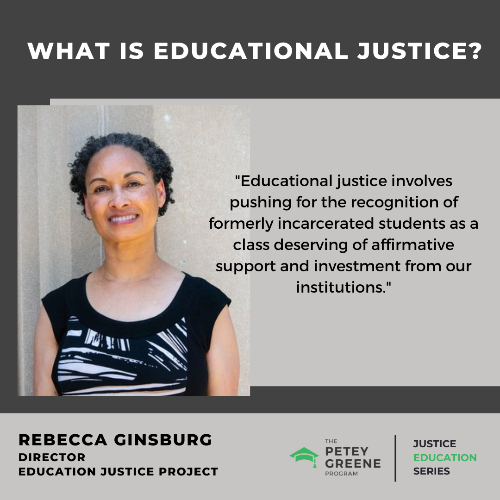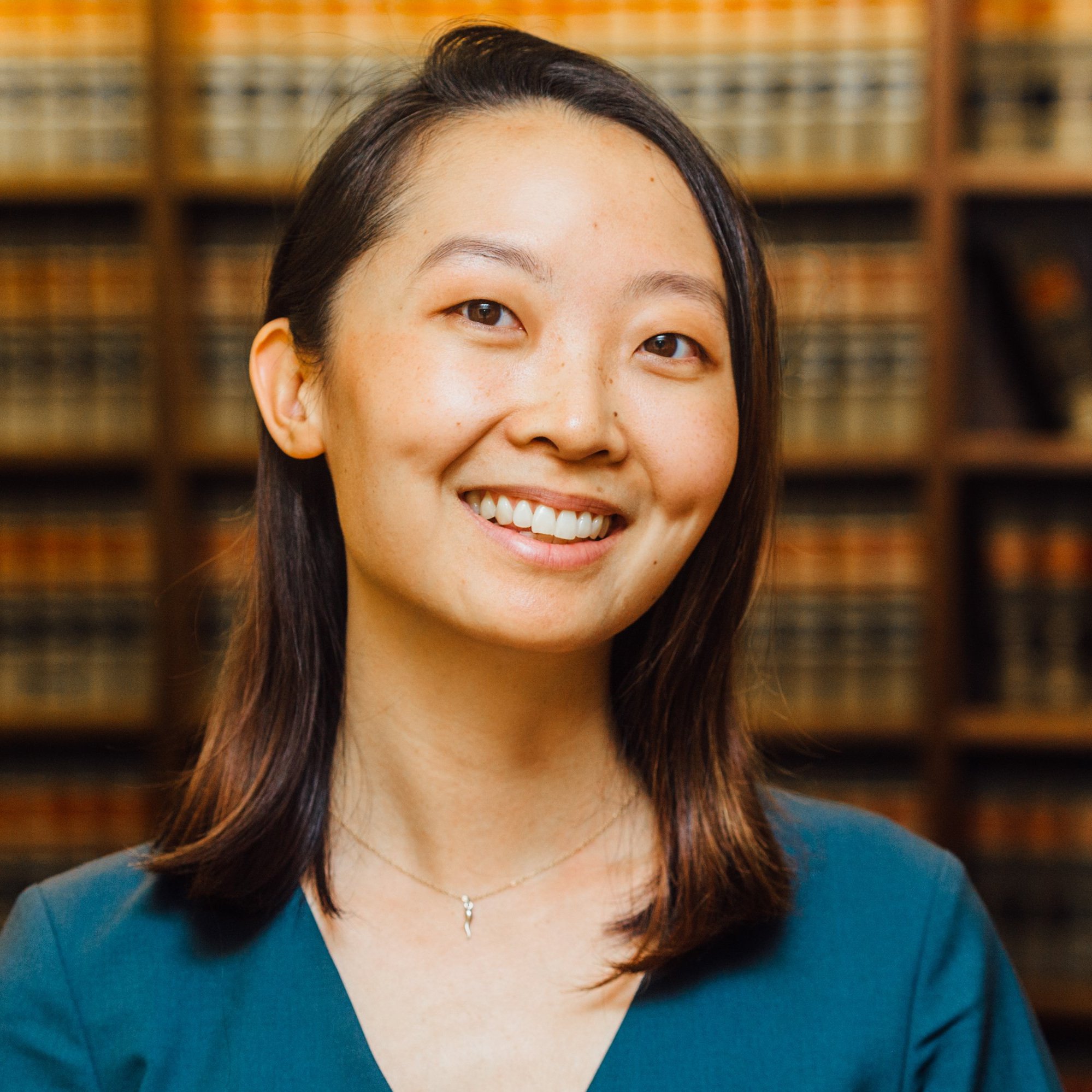November 2022 Newsletter
News: The PGP receives grant from Good Green
We are honored to join the third round of beneficiaries of the Good Green grant program from Green Thumb Industries, which supports mission-driven initiatives to help repair the harm of the war on drugs. We look forward to expanding our educational programs with the support of Good Green!
News: Board President Yusuf Dahl speaks with All the Wiser
From poverty to crime. From prison to Princeton. From entrepreneur to educator. Through it all, Yusuf Dahl has remained a creator, educator, and activator of ideas, programs, and spaces. Yusuf shares his story with Kimi Culp on the All the Wiser podcast. In honor of his episode, All the Wiser donated $2,000 to The Petey Greene Program.
News: PGP College Bridge Program volunteer receives award
Elizabeth Catchmark, a volunteer instructor and facilitator for the PGP College Bridge Writing Program at the DC Jail was selected by the International Writing Centers Association to receive the Future Leaders Scholarship. The award, conferred each year to undergraduate and graduate students who demonstrate strong leadership skills and interest in writing center studies, recognizes her work leading the College Bridge Program's weekly tutor workshops. Congratulations, Elizabeth!
By Taliya Allen, Regional Manager, PGP Pittsburgh
Building Community of Volunteers
On an icy January morning on Pittsburgh's East Side we gathered: twenty volunteers, Petey Greene Program (PGP) staff from across regions, and a panel of advocates, some formerly incarcerated, some invested for the sake of it. Our goal was manifold: to introduce the volunteers to the program we were launching, to disabuse them of any misconceptions about what it means to be a volunteer in a carceral environment, to make meaningful connections, and to break bread and eat together. It is universal law that shared food unites people, even worlds apart. When I began working at the Petey Greene Program in the Fall of 2019, I came with the intention of building community. I designed gatherings that would allow volunteers to connect with one another to make meaning of their tutoring experience, learn from members of the community engaged with the carceral system, and come together in a way that repudiates the stark and often heavy nature of our work together. During this weekend, between completing paperwork, training modules, and run of the mill logistics, we ate together, got to know each other, and contemplated the forces that brought us to this wide-windowed room in the heart of East Liberty. At the conclusion of the weekend I was able to hear what went well and what didn’t, the things that stood out, that stung, or that informed. This concretized for me the need to have spaces like this, often, to make meaning, to problematize, to ensure that there is room to process, and to unite around our shared passion for helping incarcerated learners. We were making our own little community. Unfortunately, we would soon be introduced to the COVID 19 pandemic, and our understanding of community and how to cultivate it would be challenged. Building Community Between Volunteers and Students
At the Petey Greene Program, we often refer to Freedom Dreams, a concept developed by historian Robin D.G. Kelly in his work Freedom Dreams: The Black Radical Imagination. In our context it describes the myriad ways incarcerated and formerly incarcerated people envision their lives changing as a result of their education. It is what they hope for, what they believe they can accomplish, and is the guiding factor in determining their more finite goals through the semesters. But dreams die in darkness and isolation, and we cannot discount the importance of company that recognizes, fosters and fans the flame of our dreams. Our tutors support the vision of these dreams at the end of the tunnel while our students toil towards them, challenges be damned. The type of community that tutors and students build in their pairings is the type that we believe fosters a nurturing learning environment, one that is rooted in trust and mutually assured success. Students learn best from people they like and trust, and when intrinsic motivation fails, the knowledge that someone is rooting for you, someone is paying attention to your success, is often the saving grace. The success of students in the Pittsburgh region and beyond is largely because of their own dogged determination to improve their lives, but the importance of being in community cannot be overstated. For incarcerated learners, being able to build relationships and community with their tutors from semester to semester, and not being alone in the pursuit of their goal, has made an enormous impact.
On November 16th, we hosted the webinar, What Is Educational Justice?, where practitioners who are engaged in the work of educational justice applied answers to these five broad questions: (1) What is educational injustice/justice? (2) What is the relationship between mass incarceration, the carceral state, and educational justice? (3) Why should prison education programs pursue education justice? (4) In what ways does high-quality educational programming support the freedom dreams of currently incarcerated and formerly incarcerated people? (5) What is the relationship between educational justice, reform, abolition, and freedom dreaming?
We want to thank the panelists and all who attended for joining us in a fantastic conversation about educational justice.
The Justice Education Series is a central pillar of our work to educate volunteers and the public on the injustice manifest in our carceral system and on the policies and practices that create mass incarceration and produce the educational experiences of the incarcerated and formerly incarcerated learners that we support.
In the Justice Education Series we prioritize hearing from system-impacted experts and compensating them for their time and expertise. Your support is essential to our work. Please consider making a gift to the Petey Greene Program today.
In case you missed it...
PGP welcomes new Chief Executive Officer, Jeffrey Abramowitz
The Petey Greene Program and our board of trustees are proud to welcome Jeffrey Abramowitz, J.D. as our next Chief Executive Officer! We are excited to have Jeff join the PGP team and lead our work towards educational justice beginning December 1, 2022.
Jeff comes to the PGP with deep experience in supporting currently and formerly incarcerated people towards their academic, workforce, and reentry goals. Prior to joining the PGP he served as the Executive Director of Justice Partnerships at JEVS Human Services. Previously, he has also held positions at JEVS as the Executive Director of Reentry Services and the Program Director of JEVS’ Looking Forward Philadelphia Reentry Program.
Along with his work experience, Jeff is actively involved on several boards, including the Coalition on Adult Basic Education where he serves as Secretary of the Board and oversees the State Advocates for Adult Education Fellowship Program, You Matter Marathon, and Eastern University Prison Education Project. He was appointed to the Pennsylvania Reentry Council and serves as Chairman of the Employment Committee, and also co-chairs the Reentry Committee for the Pennsylvania Workforce Development Board. Finally, he is the current Chair of the Philadelphia Reentry Coalition and was recently appointed to the Montgomery County Pennsylvania Public Defender’s Association Advisory Board.
Jeff lectures and speaks across the country on issues of workforce development, adult education, reentry, and criminal justice. He is a subject matter expert for the US Department of Education and serves as Moderator for the LINCS Community of Practice on Correctional and Reentry Education and has worked on the Integrated Education & Training in Corrections Project. He is the producer and host of the award-winning weekly radio/television show Looking Forward, co-host and producer of the Behind Every Employer podcast, and producer for the Advocast podcast.
“We are thrilled to welcome Jeff as the Petey Greene Program’s CEO. It’s a pivotal moment for our work at the PGP and we believe with Jeff’s transformational leadership we will bring to fruition our vision of a world where all currently and formerly incarcerated people have access to high-quality academic programs.”
Please join us in welcoming Jeff to the Petey Greene Program and stay tuned for opportunities to meet and hear from Jeff in the coming months!
Meet the PGP's new Board Members
David J. Harding
University of California, Berkeley
Professor of Sociology, Director, Berkeley D(ata)-Lab
David J. Harding is a Professor of Sociology at the University of California, Berkeley and Director of the Berkeley D(ata)-Lab. David’s research and teaching is focused on poverty, inequality, education, the criminal justice system, and statistical and qualitative research methods. He has published multiple scholarly articles on the impacts of incarceration and other forms of justice system involvement and written two books on prisoner reentry and reintegration: On the Outside: Prison Reentry and Reintegration (with Jeffrey Morenoff and Jessica Wyse, University of Chicago Press, 2019), and After Prison: Navigating Adulthood in the Shadow of the Justice System (with Heather Harris, Russel Sage, 2020). Harding earned a BA in Sociology from Princeton (1998) and a PhD in Sociology and Social Policy from Harvard (2005). He has also served on the faculty in Sociology and the Ford School of Public Policy at the University of Michigan.
Grace Li
Clinical Lecturer in Law
Arthur Liman Center for Public Interest Law, Yale Law School
Grace Li is a Clinical Lecturer in Law with the Arthur Liman Center for Public Interest Law at Yale Law School. Previously, she held a fellowship at the New York Civil Liberties Union, where she worked on behalf of people in prison and on parole, and clerked on the Third Circuit Court of Appeals. She graduated from Princeton University and NYU School of Law, where she was a Root-Tilden-Kern Public Interest Scholar and worked with the Equal Justice Initiative clinic, Federal Defender clinic, and public defenders’ offices. Before that, Grace worked with The Petey Greene Program as a manager of the New York region, as a student leader, and as a volunteer tutor.
Sixto Sime
Chief Consultant
LowerDeckEnterprises, LLC
Sixto Sime is the Chief Consultant at LowerDeckEnterprises, LLC, where his focus is on healthcare management. He has worked as a community liaison with The Educational Alliance, one of the oldest nonprofits in the NYC area. He currently is on the Leadership Team of the TPW New York chapter whose focus is on the system-impacted community. He holds an MSOL from Nyack College and a BA as well for Organizational Management.
Please join us in welcoming David, Grace, and Sixto to the Petey Greene Program!









